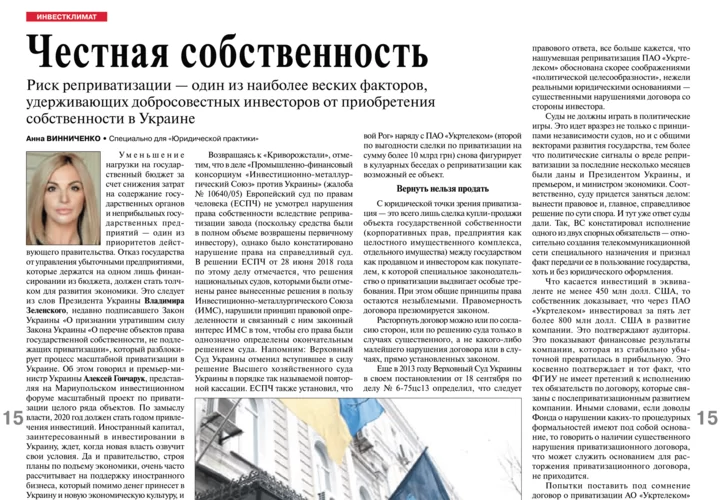The risk of reprivatization is one of the most significant factors preventing conscientious investors from acquiring property in Ukraine
09.11.2019

Managing Partner of WinnerLex Law Firm, Anna Vynnychenko, shared her thoughts with “Legal Practice” publication regarding the reprivatization processes in Ukraine, specifically about PJSC “Ukrtelecom.”
Reducing the burden on the state budget by lowering costs for maintaining state bodies and non-profitable state enterprises is one of the priorities of the current government. The state’s abandonment of managing loss-making enterprises, which rely solely on budget financing, should serve as a catalyst for economic development. This follows from the words of President Volodymyr Zelensky, who recently signed the Law of Ukraine “On Recognizing the Law of Ukraine ‘On the List of State Property Objects Not Subject to Privatization’ as Invalid,” which unlocks the process of large-scale privatization in Ukraine. Prime Minister Oleksiy Honcharuk also spoke about this at the Mariupol Investment Forum, presenting a large-scale privatization project for several state-owned objects. According to the government’s plan, 2020 should be the year of attracting investments. Foreign capital, interested in investing in Ukraine, is waiting for the new administration to announce its terms. The government, in building plans for economic recovery, often counts on the support of foreign businesses, which, besides capital, will bring new economic culture and new business management models to Ukraine. However, foreign investors are not so reckless: serious investments will only be made if there are sufficient guarantees.
At the same time, neither infrastructure (or rather its absence), the taxation system, nor even the judicial system are as strong a deterrent as the lack of guarantees for the real protection of property rights in Ukraine. And when, against the backdrop of preparations for large-scale privatization, there are discussions about the intention to carry out reprivatization, it scares off even the most interested investors.
The Story of One Reprivatization
When “reprivatization” is mentioned in Ukraine, two giant plants come to mind — “Kryvorizhstal” and the Nikopol Ferroalloy Plant (NFP). Few people today remember another Nikopol plant — the South Pipe Plant, which was driven into bankruptcy due to an attempted reprivatization. And while some perceive the reprivatization of “Kryvorizhstal” as a successful case for the state (resulting in 24.2 billion UAH raised, 5.7 times more than during the initial privatization), it should not be forgotten that this is almost the only case that brought real money into the country’s economy. After that, no serious investor was attracted to real production in Ukraine. This happened because investors saw that the Ukrainian government had no difficulty adopting laws or facilitating judicial decisions that could strip the winner of a privatization contest of its acquired property. The reprivatization of NFP did not take place, but the legal battles and the resolution of legal issues in the political sphere significantly damaged Ukraine’s investment appeal. Owners need real legal guarantees, not just assurances from politicians.
Returning to “Kryvorizhstal,” it should be noted that in the case “Industrial-Financial Consortium ‘Investment-Metallurgical Union’ vs. Ukraine” (complaint No. 10640/05), the European Court of Human Rights (ECHR) did not find a violation of property rights due to the reprivatization of the plant (since the funds were fully returned to the original investor), but it did acknowledge a violation of the right to a fair trial.
In its decision of June 28, 2018, the ECHR noted that the national court rulings that annulled earlier decisions in favor of the Investment-Metallurgical Union (IMU) violated the principle of legal certainty and the related legitimate interest of IMU in having its rights definitively determined by the final court decision. To remind: the Supreme Court of Ukraine annulled the decision of the Higher Economic Court of Ukraine under the so-called repeated cassation procedure. The ECHR also found that the legal processes against IMU in Ukraine, particularly in 2005, did not meet the standards for a fair trial as outlined in the European Convention on Human Rights.
The reference in the ECHR’s decision to the statements of government representatives concerns the position of President Viktor Yushchenko and Prime Minister Yulia Tymoshenko, who, immediately after being elected and appointed to office in early 2005, announced their intention to review the privatization of “Kryvorizhstal.”
This was a very alarming signal for investors, which, in the summer of 2005, Alexander Paskhaver, who was then an advisor to the President of Ukraine, wrote about, warning that “when they hit on ‘bad owners,’ they hit the economy too,” and cautioned that public opinion regarding the fairness of such processes is a very questionable basis for such decisions. However, by that time, the process was already unstoppable. And how much Ukraine lost in investments after 2005, when it took property away from its owner, has never been calculated. And, no matter how much the “Kryvorizhstal” case is praised, or presented as an example of successful reprivatization, today, PJSC “ArcelorMittal Kryvyi Rih” alongside PJSC “Ukrtelecom” (the second most profitable privatization deal worth over 10 billion UAH) is again a subject of behind-the-scenes discussions about reprivatization as a possible target.
Cannot Be Returned, Cannot Be Sold
From a legal perspective, privatization is merely a transaction of buying and selling a state-owned asset (corporate rights, an enterprise as a whole property complex, or separate assets) between the state as the seller and the investor as the buyer, with special privatization legislation setting specific requirements. At the same time, general legal principles remain unchanged. The legitimacy of the contract is presumed by law. A contract can be terminated either by mutual consent or by a court decision, but only in cases of a significant violation of the contract, not minor ones, or in cases explicitly provided by law.
As early as 2013, the Supreme Court of Ukraine in its ruling of September 18, in case No. 6-75cs13, defined what should be considered a material breach of contract and noted that, in addition to the existence of a material breach, the courts must also establish whether there is harm caused to the other party and determine whether the difference between what the party could have reasonably expected when entering into the contract and what it actually received is substantial.
Since the termination of a contract by court decision is always a consequence of a contract violation, the court must necessarily establish the fault of the party who violated the contract.
Such a breach of the privatization contract — specifically, the non-fulfillment of two out of 50 of its terms — became the formal reason for initiating the return of PJSC “Ukrtelecom” to state ownership by the claim of the State Property Fund of Ukraine (SPFU) in May 2017. Interestingly, initially, the courts of the first and appellate instances fully satisfied the claim of the SPFU and ruled to terminate the contract. The Supreme Court (SC) disagreed with their conclusions and sent the case for reconsideration. When, upon reconsideration, the lower courts completely rejected the claim, the SC also disagreed and again returned the case for reconsideration. What the final decision should be — is a rhetorical question. And while there is no legal answer yet, it increasingly seems that the high-profile reprivatization of PJSC “Ukrtelecom” is based more on “political expediency” than on real legal grounds — substantial violations of the contract by the investor.
Courts should not play political games. This contradicts not only the principles of judicial independence but also the general directions of the state’s development, especially since political signals about the harm of reprivatization have recently been given by the President, Prime Minister, and Minister of Economy. Accordingly, the court will have to address the case: render a legal and, most importantly, fair decision on the merits of the dispute. And here, the courts have already provided an answer. The SC concluded that one of the two disputed obligations had been fulfilled — specifically, the creation of a special-purpose telecommunications network, and it acknowledged that it had been transferred for state use, albeit without legal formalization.
Regarding investments of at least USD 450 million, the owner proves that over the past five years, PJSC “Ukrtelecom” invested more than USD 800 million into the company’s development. This is confirmed by auditors. It is reflected in the company’s financial results, which turned from consistently loss-making into profitable. This is also indirectly confirmed by the fact that the SPFU has no claims regarding the fulfillment of the contractual obligations related to the post-privatization development of the company. In other words, if the SPFU’s arguments about violations of some procedural formalities are valid, it cannot be said that there is a substantial violation of the privatization contract, which could serve as grounds for its termination.
Attempts to question the privatization contract of PJSC “Ukrtelecom” without sufficient justification are an infringement on the right to property and an attempt to revisit relations established nearly ten years ago. This is entirely inconsistent with the principle of legal certainty.
In general, the state’s involvement in prolonged legal battles regarding reprivatization first in Ukraine and, quite possibly, later in international jurisdictions negatively impacts the investment climate. If the case regarding reprivatization ends up in the ECHR again, the esteemed court may not be as lenient toward the Ukrainian government. The ECHR has already shown its position on “political expediency” in the case of Polyakh and Others v. Ukraine (complaints Nos. 58812/15, 53217/16, 59099/16, 23231/18, and 47749/18), which concerned lustration. If the dispute arises over a foreign investment object, aside from national courts and the ECHR, the issue of protecting the investor’s rights may be raised at the International Centre for Settlement of Investment Disputes (ICSID) or other international arbitrations. This, in addition to harming the country’s image, where private property rights are not protected, would also result in significant financial costs for litigation.
A distinctive feature of Ukraine’s current situation is the close attention of the world to internal processes. Therefore, any action against property in Ukraine today will not go unnoticed by foreign investors. This means that serious, honest, and transparent businesses will be hesitant to invest in Ukraine — few would want to pour money into a country where they might have to fight for their own property for years.
